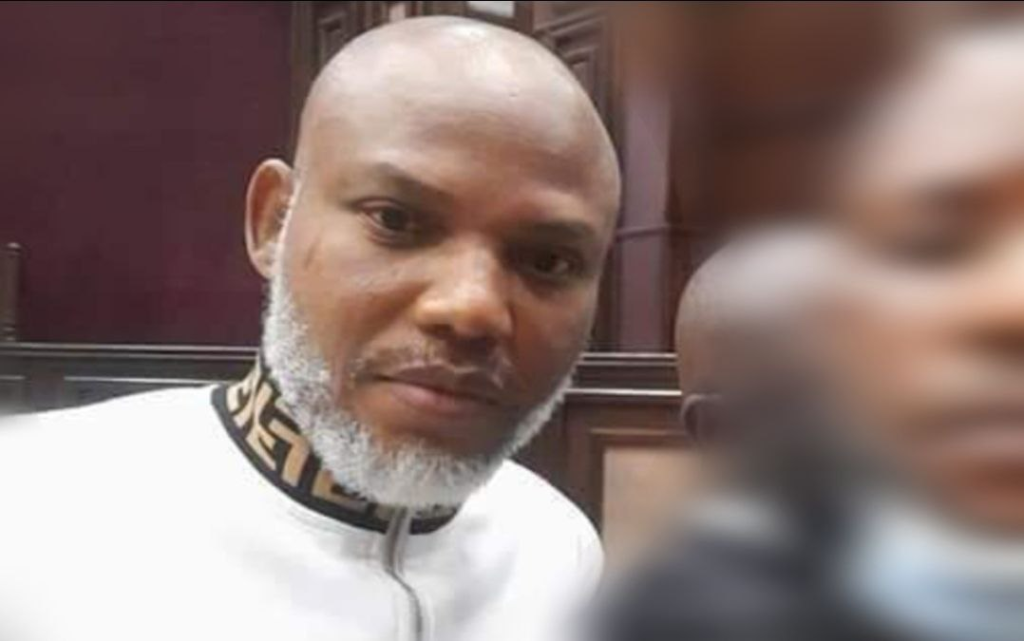
Olayomi Koiki
The Council of South East Traditional rulers has appealed to the Nigeria’s Federal Government to release Nnamdi Kanu, the illegally detained leader of the Indigenous People of Biafra (IPOB), saying his eventual freedom will reduce tension in the south east zone of the country.
The chairman of the Council, Igwe Samuel Asadu made the call, when he featured at the News Agency of Nigeria Forum in Abuja on Sunday.
Asadu said that the council was in support of stakeholders call for his release such as the south east governors, lawmakers and the entire people of the zone.
“He is our son. He has been there for a long time, in spite of the ups and down with the judiciary,” said the chairman.
“Off course, we back the Governors Forum and other stakeholders’ call for his release so that tension will be reduced.
“We before that the government will do its due diligence to ensure that people are guaranteed that the release won’t go beyond what is expected. There should be some form of measures, a deal to be made.”
The chairman said that the eventual release of Kanu would to a large extent usher in a relative calmness and evoke joy to the people of the zone.
“If the president looks into that and gives him a pardon,we will be excited. It is affecting our area, because his absence. Some of the people are his die hard fans.
“So, who will want to have his son locked up for a long time, of course we are praying every day, all the traditional rulers are praying for Nnamdi Kanu to be released.
“We feel his pains and the pain of his family.
“It will be a gift, if the President does that. We will come back to thank him in a big way,” News Agency of Nigeria (NAN) quoted Asadu as saying.
Kanu is facing trial on terrorism charges levelled against by then-President Muhammadu Buhari’s administration over his call and agitation for a sovereign state of Biafra. Kanu was extraordinarily renditioned from Kenya in June 2021 by former President Buhari’s government and has remained in detention since then.
Mr Kanu’s initial arrest in 2015 triggered protests by his supporters.
In 2017, Justice Binta Nyako of a Federal High Court in Abuja granted Kanu bail.
Upon his release, a military invasion of his ancestral home in Umuahia, Abia State, in September 2017, forced into exile, hence he did not attend his trial on the next scheduled date and thereafter. From then till June 2021 when he was abducted from Kenya and was subjected to “extraordinary rendition”, and brought back to Nigeria, there has been a robust public debate as to whether he jumped bail or not.
But, the Appeal Court had discharged and acquitted Kanu of all terrorism charges. This judgment was later overturned by the Supreme Court which transferred the case back to the Federal High Court.
Kanu’s attorney, Aloy Ejimakor, in January, clarified that the Supreme Court had settled the controversy on whether Kanu jumped bail or not.
The attorney said the Supreme Court also clarified that Kanu’s bail “should not have been revoked”.
In the Certified True Copy (CTC) of the judgment delivered in December 2023, the apex court declared that Kanu did not jump bail.
IPOB wants a group of states in the south-east of Nigeria, which mostly comprises the Igbo ethnic group, to break away from the country and form an independent nation called Biafra.
In 1967 Igbo leaders declared independence for the state of Biafra, but after a civil war, which led to the deaths of millions of people, the self-determination movement was defeated.
But the idea of Biafra has never gone away and despite arrests of his members, Mr Kanu’s movement hasseen a recent swell in its numbers.
All peoples have the right to self-determination. By virtue of that right they freely determine their political status and freely pursue their economic, social and cultural development, according to the United Nations Charter.
Essentially, the right to self-determination is the right of a people to determine its own destiny. In particular, the principle allows a people to choose its own political status and to determine its own form of economic, cultural and social development. Exercise of this right can result in a variety of different outcomes ranging from political independence through to full integration within a state.
KOIKI Media bringing the world 🌎 closer to your door step
